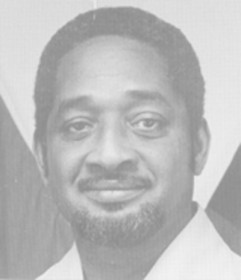Late Guyanese President Forbes Burnham is to be honoured by the South African government with the Oliver Tambo Award
The award, established in 2002, is conferred on foreign nationals (Heads of State and Government) and other foreign dignitaries for friendship shown to South Africa. During the 1970s and 1980s, under Burnham’s leadership Guyana played a leading role among third world countries in opposing apartheid in South Africa and helping liberation movements in southern Africa.

The following press release was today issued on behalf of his family:
“Ms. Roxane Van West Charles will be traveling to Johannesburg, South Africa to accept the Oliver Tambo Award (Gold), which was conferred on her father, the late President L F S Burnham by President Zuma. She will be accompanied by her sister, Dr. Francesca Onu, and her husband, Dr. Richard Van West Charles. The award ceremony will take place on the 27th April.
“The Order of the Companion of OR Tambo is a South African honour which was established on the 6th December 2002 and is granted by the President of South Africa to foreign citizens who have “promoted South African interests and aspirations through cooperation, solidarity, and support.” In the letter from the South African government dated the 12th March and addressed to Ms. Roxane Van West Charles, it is stated that the award was conferred on Mr. Burnham “…. for his integral part in sport boycott against South Africa during the apartheid regime and support for the liberation movement and freedom fighters in South Africa.”
“In the meantime, a spokesman for the Burnham family has pointed out that the success of Mr. Burnham’s policies on the Liberation of Southern Afirca in general, and South Africa in particular, is a matter of public record. For this reason, among others, he expressed the view that his political, diplomatic and material contribution to the struggle for the termination of colonialism in Africa and the liberation of the states in the southern part of the continent is unarguable. As a student in London, Mr. Burnham embraced the idea that the African continent must be liberated and worked along with his fellow West Indians and African students and intellectuals towards this goal. On his return to Guyana, Mr. Burnham made this an essential platform of his Party, the People’s National Congress, which was formed in 1957. Symbolic of his commitment to the liberation of the African continent, Mr Burnham and his political colleagues decided to celebrate “Ghana Day” in commemoration of the independence of Ghana, the first African country to win its independence after the end of the Second World War. Relatedly, there was a programmatic and sustained effort to educate the Guyanese public about the evolution events in Southern Africa.
“And in this very period, Mr. Burnham delivered what some consider his best speech to local legislature when he spoke for several days to support the argument for the isolation of the apartheid regime in South Africa. He also signaled the unrelenting opposition of himself and his Party to the apartheid regime and all of its works.
“As Prime Minister and later President of Guyana the policy of opposition to colonialism and oppression in Southern Africa and the liberation of their peoples was firmly maintained and sustained. This was given expression at the nonaligned Summit in Lusaka Zambia, in 1970, when Mr. Burnham announced that Guyana would make an annual contribution to the fight for the liberation of Southern Africa. On World Solidarity day on May 25, 1975, Mr. Burnham explained the policy of offering material assistance to the liberation movements in Southern Africa:
“`We give because we considered it our duty to give. We gave not only because to some of us, the Africans are blood brothers, but also because we were convinced, and still are convinced, that so long as imperialism wonders abroad in any part of the world, our own hard-won freedom is at stake.’
“This was complemented by the award of scholarships to African students to educational institutions in Guyana and an active foreign policy, carried out in concert with other like-minded states, which was geared towards isolating the apartheid regime in South Africa, particularly in sports, and the sustaining political support for the liberation movements. The family spokesman also indicated that Mr. Burnham, in carrying out his policies in Southern Africa and elsewhere on the continent was ably assisted by his then Foreign Minister, Mr. Rashleigh Jackson, his Permanent Representative to the United Nations, Mr. Noel Sinclair, and several others, too numerous to mention. In particular, the policies were executed by an efficient Foreign Ministry which possessed at this time some of the finest diplomatic offices the country has known.
“But it was the decision to allow Cuban planes to land in Guyana in 1975 which demonstrated Mr. Burnham’s exceptional courage and support for the liberation of the Southern Africa. The presence of Cuban troops in Angola not only tilted the balance of forces in favour of the true fighters for freedom but also changed the strategic equation in Southern and hastened the liberation of several states in that part of the continent. The liberation of Angola and Mozambique, among other factors, were consequential in the eventual birth of freedom in South Africa itself.”
